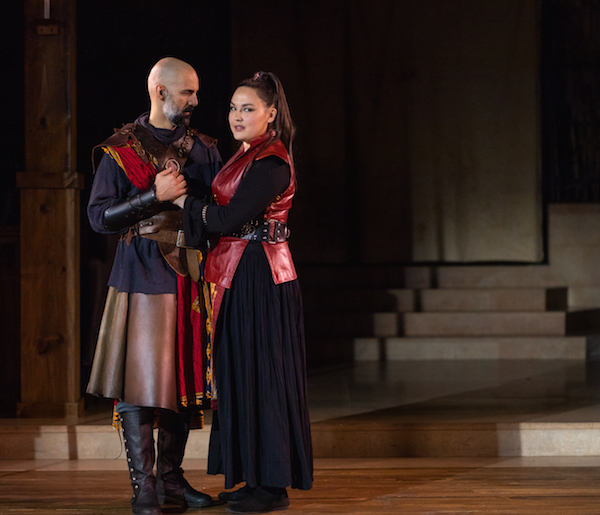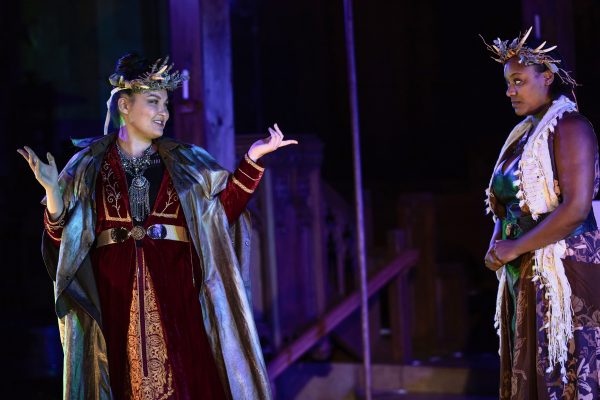Theater Review: “Macbeth” — Shakespeare Re-vamped
Most of the time, Actors’ Shakespeare Project’s production of Macbeth is compelling.
Macbeth by William Shakespeare, via a modern verse translation by Migdalia Cruz.
Directed by Dawn Meredith Simmons. Staged by the Actors Shakespeare Project at the United Parish, 210 Harvard Street, Brookline, MA, through November 11.

Nael Nacer as Macbeth and Paige Clark as Lady Macbeth in the Actors’ Shakespeare Project’s production of “Macbeth.” Photo: Babette Kania.
By Erik Nikander
Setting out to revise and update one of the most acclaimed plays in Shakespeare’s canon is a risky proposition. Done without care, this is the sort of thing prone to going awry, bewildering general audiences and making hardcore fans of the Bard grind their teeth into dust. So it is understandable that many might approach the Actors’ Shakespeare Project’s production of Macbeth, based on a modern verse translation by Migdalia Cruz, with trepidation — even a touch of anxiety. Luckily, the end result turns out to be a pleasant surprise — at least as far as the text is concerned. While the production falters because of discordant creative decisions, Cruz’s take on Shakespeare’s bloody tale of Scottish regicide proffers a solid and thoughtful poetic interpretation.
As if acknowledging that updating Shakespeare’s work might rankle a purist or two, Cruz’s modern verse translation ruffles as few feathers as possible. The playwright maintains a great deal of the play’s original poetry, opting to artfully revise the more archaic bits of Macbeth without pushing too hard to make the show feel “timely.” This version, according to the program, is part of an effort by the Oregon Shakespeare Festival to create “translations of Shakespeare’s plays that are both performable and extremely useful reference texts” to help students and actors gain a firmer grasp of the meaning of these plays without losing what makes them special. Viewed in that context, Cruz’s subtle reinterpretation of Macbeth is a resounding success.
Unfortunately, while the re-vamped script remains crisp and compelling, the production feels as if it’s undergoing something of an identity crisis. Director Dawn M. Simmons’s take on the material is not without merit, but at times the proceeds lack cohesion. Consider, for instance, the performances. Nael Nacer stars as Macbeth, and does quite a good job at making the Scotsman’s descent into evil feel natural. He imbues the monarch with an agreeably pathetic, in-over-his-head quality. In the vein of William H. Macy in Fargo, it is difficult not to feel a little bad for him even as his actions grow increasingly repellent. Physically, he’s limber and loose, portraying Macbeth’s occasional dopiness (the result of fear and trauma?) with ease and gusto.
However, while Nacer’s take on the character is compelling, it doesn’t always dovetail with the rest of Simmons’s creative vision. For instance, Maurice Parent’s performance as Banquo comes off as more classically “Shakespearean.” Matching Banquo’s forthright nature, Parent imbues the character with plenty of moral fortitude through his ramrod-straight integrity and physical presence. Though Parent’s Banquo and Nacer’s Macbeth are both effective performances, they feel as if they are reflecting different interpretations of the play. Yes, a certain degree of disparity between these two characters makes sense — but when the stylistic contrast is stretched to this extreme it becomes confusing, undercutting the believability of the production.
By and large the ensemble cast does fine work, though their individual performances don’t always mesh into a dramatic whole. Paige Clark’s portrait of Lady Macbeth’s breakdown is riveting and heart-rending, and she also shines in her brief but memorable turn as the delightfully evil Hecate. Steven Barkhimer is quite funny as the Porter, though he is only able to flex his comedic muscles for this famous short scene. The portrait of the witches, on the other hand, is a failure. Simmons’ comedic take on the weird sisters, who are played by three members of the ensemble, includes (literal) winks to the audience and a baffling rap performance. The approach may be aiming at self-referential humor, but the result is cutesy and unconvincing.

Paige Clark as Lady Macbeth and Jade Guerra as Weird Sister in the ASP production of “Macbeth.” Photo: Babette Kania.
The scenic design by Jon Savage is simple but effective, consisting mostly of austere wooden frames set against a backdrop of spindly, bare branches. The interior of the United Parish in Brookline proves a tad problematic in terms of sound (the further away the actors venture in the space, the more of their dialogue is swallowed up by echo), but it provides a properly medieval atmosphere. Laura Hildebrand’s lighting work stands out as bold and imaginative, blanketing the witches in neon green and orange and casting heavy shadows over Nacer’s face during Macbeth’s most conflicted moments.
Rachel Padula-Shufelt’s costume design could draw sharper distinctions between characters, especially since everyone in the cast plays more than one role. The number of costumes needed for the production is impressive, but it becomes confusing when, on occasion, a member of the ensemble swapped from one role to another — but wore similar clothing. The fight choreography throughout Macbeth, designed by Jesse Hinson, was strong overall, but needs a bit of tightening up. Much of the combat is executed with impressive realism and stomach-turning brutality, but then the occasional punch flies so wide that it shatters the illusion.
Most of the time, Actors’ Shakespeare Project’s production of Macbeth is compelling. Cruz’s translation is top-notch, the performances are strong across the board (highlighted by Nacer’s distinctive and heartfelt take on the title role), and the technical work succeeds more often than it fails. Still, some of the directorial choices don’t quite gel, so the show comes off as jumbled when it should be cohesive. This is a Macbeth with an identity crisis — it isn’t quite sure what it wants to be.
Erik Nikander is a critic, playwright, and filmmaker based in the New England area. His film criticism can be read on Medium and his video reviews on a variety of topics can be viewed on Youtube at EWN Reviews.

Sounds awful. Out, out doggone spot.